Related Research Articles

Derry, officially Londonderry, is the largest city in County Londonderry, the second-largest in Northern Ireland and the fifth-largest on the island of Ireland. The old walled city lies on the west bank of the River Foyle, which is spanned by two road bridges and one footbridge. The city now covers both banks.
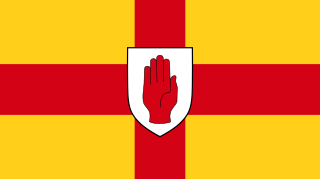
Ulster is one of the four traditional or historic Irish provinces. It is made up of nine counties: six of these constitute Northern Ireland ; the remaining three are in the Republic of Ireland.
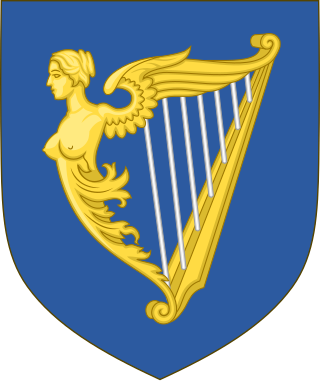
The Irish Parliamentary Party was formed in 1874 by Isaac Butt, the leader of the Nationalist Party, replacing the Home Rule League, as official parliamentary party for Irish nationalist Members of Parliament (MPs) elected to the House of Commons at Westminster within the United Kingdom of Great Britain and Ireland up until 1918. Its central objectives were legislative independence for Ireland and land reform. Its constitutional movement was instrumental in laying the groundwork for Irish self-government through three Irish Home Rule bills.

The Senate of Northern Ireland was the upper house of the Parliament of Northern Ireland created by the Government of Ireland Act 1920. It was abolished with the passing of the Northern Ireland Constitution Act 1973.
The Nationalist Party was a term commonly used to describe a number of parliamentary political parties and constituency organisations supportive of Home Rule for Ireland from 1874 to 1922. It was also the name of the main Irish nationalist Nationalist Party in Northern Ireland from 1921 to 1978.
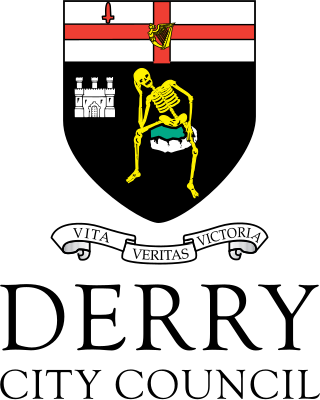
Derry City Council was the local government authority for the city of Derry in Northern Ireland. It merged with Strabane District Council in April 2015 under local government reorganisation to become Derry and Strabane District Council.
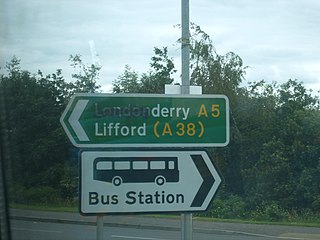
The names of the city and county of Derry or Londonderry in Northern Ireland are the subject of a naming dispute between Irish nationalists and unionists. Generally, although not always, nationalists favour using the name Derry, and unionists Londonderry. Legally, the city and county are called "Londonderry", while the local government district containing the city is called "Derry City and Strabane". The naming debate became particularly politicised at the outset of the Troubles, with the mention of either name acting as a shibboleth used to associate the speaker with one of Northern Ireland's two main communities. The district of Derry and Strabane was created in 2015, subsuming a district created in 1973 with the name "Londonderry", which changed to "Derry" in 1984.

Free Derry was a self-declared autonomous Irish nationalist area of Derry, Northern Ireland that existed between 1969 and 1972 during the Troubles. It emerged during the Northern Ireland civil rights movement, which sought to end discrimination against the Irish Catholic/nationalist minority by the Protestant/unionist government. The civil rights movement highlighted the sectarianism and police brutality of the overwhelmingly Protestant police force, the Royal Ulster Constabulary (RUC).
Ivan Averill Cooper was a nationalist politician from Northern Ireland. He was a member of the Parliament of Northern Ireland and a founding member of the Social Democratic and Labour Party (SDLP). He is best known for leading the civil rights march on 30 January 1972 that developed into the Bloody Sunday massacre.

The Partition of Ireland was the process by which the Government of the United Kingdom of Great Britain and Ireland (UK) divided Ireland into two self-governing polities: Northern Ireland and Southern Ireland. It was enacted on 3 May 1921 under the Government of Ireland Act 1920. The Act intended both territories to remain within the United Kingdom and contained provisions for their eventual reunification. The smaller Northern Ireland was duly created with a devolved government and remained part of the UK. The larger Southern Ireland was not recognised by most of its citizens, who instead recognised the self-declared 32-county Irish Republic. On 6 December 1922, Ireland was partitioned. At that time, the territory of Southern Ireland left the UK and became the Irish Free State, now known as the Republic of Ireland. Ireland had a large Catholic, nationalist majority who wanted self-governance or independence. Prior to partition the Irish Home Rule movement compelled the British Parliament to introduce bills that would give Ireland a devolved government within the UK. This led to the Home Rule Crisis (1912–14), when Ulster unionists/loyalists founded a large paramilitary organization, the Ulster Volunteers, that could be used to prevent Ulster from being ruled by an Irish government. The British government proposed to exclude all or part of Ulster, but the crisis was interrupted by the First World War (1914–18). Support for Irish independence grew during the war and after the 1916 armed rebellion known as the Easter Rising.

Joseph O'Doherty was an Irish teacher, barrister, revolutionary, politician, county manager, member of the First Dáil and of the Irish Free State Seanad.

Protestant Irish Nationalists are adherents of Protestantism in Ireland who also support Irish nationalism. Protestants have played a large role in the development of Irish nationalism since the eighteenth century, despite most Irish nationalists historically being from the Irish Catholic majority, as well as most Irish Protestants usually tending toward unionism in Ireland. Protestant nationalists have consistently been influential supporters and leaders of various movements for the political independence of Ireland from Great Britain. Historically, these movements ranged from supporting the legislative independence of the Parliament of the Kingdom of Ireland, to a form of home rule within the United Kingdom of Great Britain and Ireland, to complete independence in an Irish Republic and a United Ireland.
Independent Unionist has been a label sometimes used by candidates in elections in the United Kingdom, indicating a support for British unionism.

Edward Gerard McAteer was an Irish nationalist politician from Northern Ireland. He was born in Coatbridge, Scotland, to Hugh McAteer and Brigid McAteer. McAteer's family moved to Derry in Northern Ireland while he was young. In 1930 he joined the Inland Revenue, where he worked until 1944. He then became an accountant and more actively involved in politics. While his brother, Hugh, became a prominent Irish republican in the Irish Republican Army (IRA) and Sinn Féin, Eddie chose constitutional nationalist politics. He was elected as the Nationalist Party Member of Parliament for Mid Londonderry in the 1945 Northern Ireland general election. He was co-founder of the Irish Anti-Partition League, founded in 1946, and became its vice chairman in 1947, then its chairman in 1953.
Claude Wilton was a politician, solicitor and civil rights campaigner from Northern Ireland.

The Home Rule movement was a movement that campaigned for self-government for Ireland within the United Kingdom of Great Britain and Ireland. It was the dominant political movement of Irish nationalism from 1870 to the end of World War I.
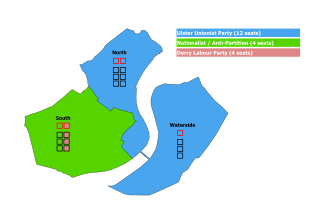
Elections to Londonderry Borough Council were held on 16 October 1946. The Ulster Unionist Party (UUP) retained their majority with Sir Basil McFarland continuing as Mayor of Londonderry. The elections were postponed from the original February date due to an unusually large number of objections to the list of electors.
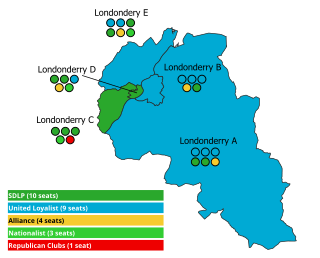
The 1973 Londonderry City Council election took place on 30 May 1973 to elect members of Londonderry City Council in Northern Ireland. This was on the same day as other Northern Irish local elections. The campaign was significant in that, following changes to the election process and districts, Irish nationalist parties were able to take control of the council for the first time.

Elections to Londonderry Borough Council were held on 17 May 1967, amidst the Northern Ireland civil rights movement.

The Troubles of the 1920s was a period of conflict in what is now Northern Ireland from June 1920 until June 1922, during and after the Irish War of Independence and the partition of Ireland. It was mainly a communal conflict between Protestant unionists, who wanted to remain part of the United Kingdom, and Catholic Irish nationalists, who backed Irish independence. During this period, more than 500 people were killed in Belfast alone, 500 interned and 23,000 people were made homeless in the city, while approximately 50,000 people fled the north of Ireland due to intimidation. Most of the victims were Nationalists (73%) with civilians being far more likely to be killed compared to the military, police or paramilitaries.
References
- 1 2 "Obituary: Mr Hugh C. O'Doherty", Irish Times , 12 March 1924.
- ↑ Bardon, Jonathon (2001), A History of Ulster, Belfast, The Blackstaff Press, pp. 466–469; ISBN 0-85640-764-X
- ↑ "Londonderry, Jan. 23", Irish Times , 24 January 1922
- ↑ "Joint Action by Ulster Catholics", Irish Times , 30 September 1922.